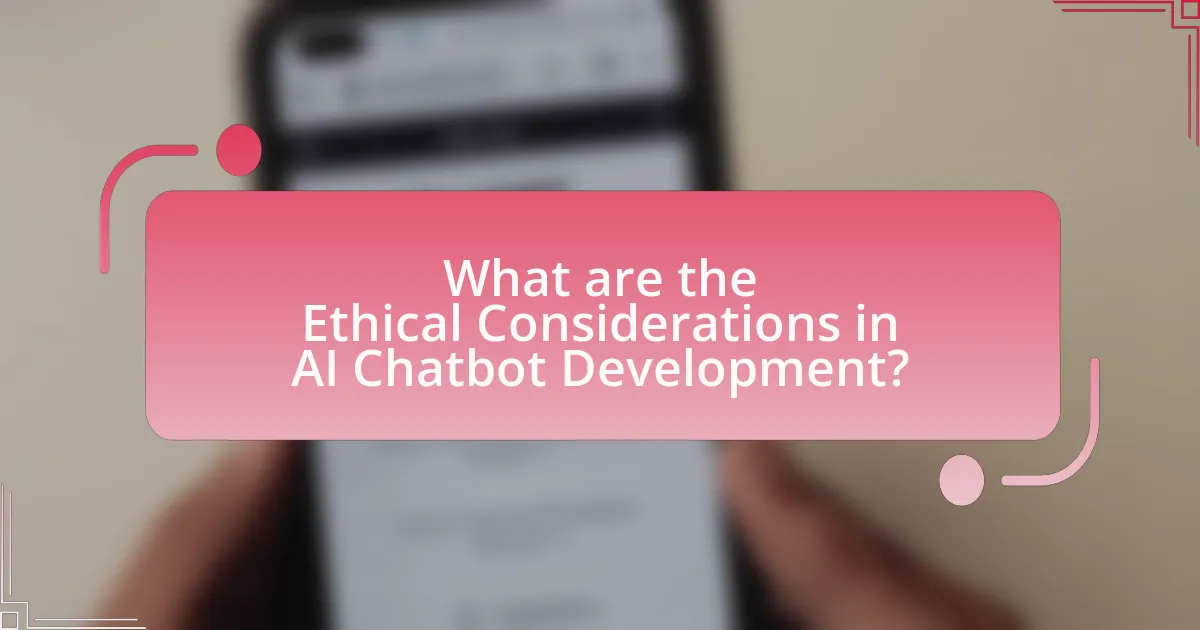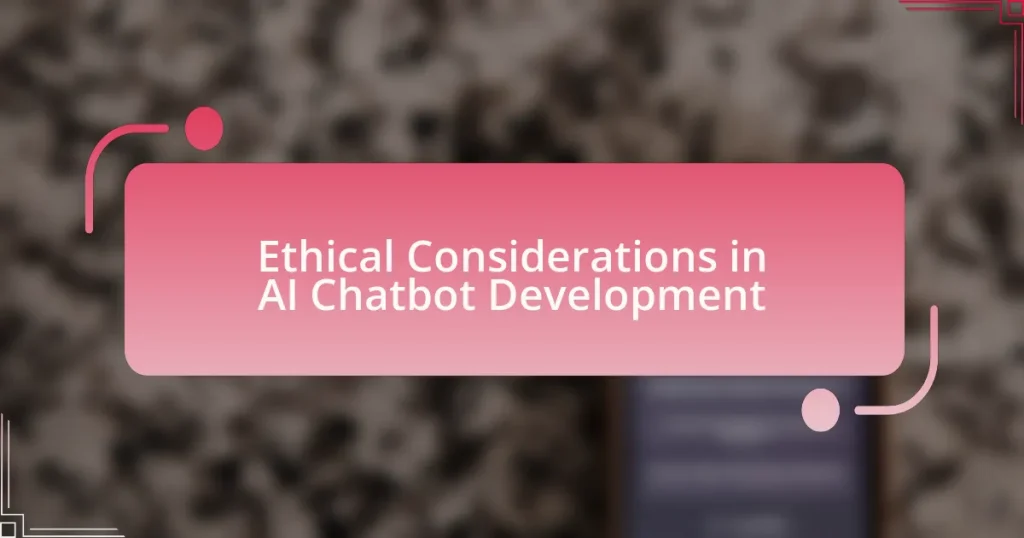The article focuses on the ethical considerations in AI chatbot development, emphasizing the importance of user privacy, data security, transparency, and bias mitigation. It outlines the ethical dilemmas developers face, such as ensuring user consent and preventing misinformation, while highlighting the impact of these considerations on user trust. Key ethical principles guiding development include accountability, fairness, and user well-being, alongside the necessity of compliance with regulations like GDPR. The article also discusses practical steps for developers to implement ethical practices, the significance of user feedback, and future trends in ethical AI chatbot development.

What are the Ethical Considerations in AI Chatbot Development?
Ethical considerations in AI chatbot development include user privacy, data security, transparency, and bias mitigation. User privacy is crucial as chatbots often handle sensitive information; developers must ensure compliance with regulations like GDPR, which mandates user consent for data collection. Data security is essential to protect against breaches that could expose personal information. Transparency involves clearly communicating the chatbot’s capabilities and limitations to users, fostering trust. Additionally, bias mitigation is necessary to prevent discriminatory outcomes, as AI systems can inadvertently reflect societal biases present in training data. Addressing these ethical considerations is vital for responsible AI deployment and user trust.
Why is ethics important in AI chatbot development?
Ethics is crucial in AI chatbot development because it ensures that the technology operates within moral boundaries, promoting fairness, accountability, and transparency. Ethical considerations help prevent biases in algorithms that could lead to discriminatory practices, as evidenced by studies showing that biased training data can result in biased outputs, impacting user trust and societal norms. Furthermore, adhering to ethical guidelines fosters user safety and privacy, as chatbots often handle sensitive information. For instance, the General Data Protection Regulation (GDPR) emphasizes the importance of data protection and user consent, highlighting the legal and ethical obligations developers must follow.
What ethical dilemmas do developers face when creating chatbots?
Developers face several ethical dilemmas when creating chatbots, primarily concerning user privacy, data security, and the potential for misinformation. User privacy is a significant concern, as chatbots often collect personal data to function effectively, raising questions about consent and data usage. Data security is another critical issue, as breaches can expose sensitive information, leading to potential harm for users. Additionally, the risk of chatbots disseminating misinformation or biased content poses ethical challenges, as developers must ensure that their systems provide accurate and fair information. These dilemmas highlight the need for responsible design and implementation practices in chatbot development.
How do ethical considerations impact user trust in chatbots?
Ethical considerations significantly impact user trust in chatbots by influencing perceptions of transparency, privacy, and fairness. When chatbots are designed with ethical guidelines that prioritize user data protection and clear communication about their capabilities, users are more likely to trust them. For instance, a study by the Pew Research Center found that 81% of Americans feel that the potential risks of data collection by AI systems outweigh the benefits, highlighting the importance of ethical practices in fostering trust. Furthermore, ethical considerations such as avoiding bias in responses and ensuring accountability can enhance user confidence, as users prefer systems that treat them fairly and respect their rights.
What are the key ethical principles guiding AI chatbot development?
The key ethical principles guiding AI chatbot development include transparency, accountability, fairness, privacy, and user well-being. Transparency ensures that users understand how chatbots operate and make decisions, fostering trust. Accountability mandates that developers take responsibility for the chatbot’s actions and outcomes, ensuring ethical use. Fairness addresses biases in AI algorithms, promoting equitable treatment of all users. Privacy emphasizes the protection of user data, adhering to regulations like GDPR. User well-being focuses on creating positive interactions that enhance user experience and avoid harm. These principles are essential for responsible AI development and align with industry standards and guidelines.
How does transparency play a role in ethical chatbot design?
Transparency is crucial in ethical chatbot design as it fosters trust between users and the technology. When chatbots clearly communicate their capabilities, limitations, and data usage policies, users can make informed decisions about their interactions. For instance, a study by the Pew Research Center found that 81% of Americans feel they have little control over the data collected by companies, highlighting the need for transparency to alleviate concerns about privacy and data security. By ensuring that users understand how their information is handled, developers can create a more ethical and user-centric experience, ultimately enhancing user satisfaction and compliance with ethical standards.
What is the significance of user privacy in chatbot interactions?
User privacy in chatbot interactions is significant because it fosters trust and encourages user engagement. When users feel that their personal information is protected, they are more likely to share relevant data, which enhances the chatbot’s ability to provide personalized responses. According to a study by the Pew Research Center, 79% of Americans express concern about how their data is used by companies, highlighting the importance of privacy in maintaining user confidence. Furthermore, ensuring user privacy is essential for compliance with regulations such as the General Data Protection Regulation (GDPR), which mandates strict guidelines on data handling and user consent. This legal framework reinforces the necessity of prioritizing user privacy in chatbot design and implementation.
How can bias be addressed in AI chatbot development?
Bias in AI chatbot development can be addressed through diverse training data, algorithmic transparency, and continuous monitoring. Utilizing diverse training datasets ensures that the chatbot learns from a wide range of perspectives, reducing the risk of reinforcing stereotypes. Algorithmic transparency involves making the decision-making processes of the chatbot understandable, allowing developers to identify and rectify biased outcomes. Continuous monitoring and evaluation of chatbot interactions can help detect and mitigate bias over time, ensuring that the system evolves to be more equitable. Research indicates that diverse datasets can significantly improve the fairness of AI systems, as shown in studies like “Fairness and Abstraction in Sociotechnical Systems” by Selbst et al., which emphasizes the importance of context in addressing bias.
What are the sources of bias in AI chatbots?
The sources of bias in AI chatbots primarily stem from biased training data, algorithmic design, and user interactions. Biased training data occurs when the datasets used to train chatbots reflect societal prejudices or imbalances, leading to skewed responses. For instance, if a chatbot is trained on text that predominantly features certain demographics, it may inadvertently favor those perspectives while marginalizing others. Algorithmic design can introduce bias through the selection of features or the way models are structured, which may prioritize certain types of information over others. Additionally, user interactions can perpetuate bias, as chatbots learn from ongoing conversations, potentially amplifying existing biases present in user inputs. These factors collectively contribute to the ethical challenges faced in AI chatbot development.
How can developers mitigate bias in chatbot algorithms?
Developers can mitigate bias in chatbot algorithms by implementing diverse training datasets and employing fairness-aware algorithms. Diverse datasets ensure that the chatbot is exposed to a wide range of perspectives and language use, reducing the risk of reinforcing stereotypes. Fairness-aware algorithms, such as those that adjust for demographic disparities, can help identify and correct biased outputs. Research indicates that using balanced datasets can significantly improve the performance of AI systems in terms of fairness, as demonstrated in studies like “Fairness and Abstraction in Sociotechnical Systems” by Selbst et al., which highlights the importance of considering social context in algorithm design.
What regulations and guidelines exist for ethical AI chatbot development?
Regulations and guidelines for ethical AI chatbot development include the General Data Protection Regulation (GDPR) in Europe, which mandates data protection and privacy for individuals, and the IEEE Global Initiative on Ethics of Autonomous and Intelligent Systems, which provides a framework for ethical considerations in AI. The GDPR requires explicit consent for data collection and emphasizes user rights, while the IEEE guidelines advocate for transparency, accountability, and fairness in AI systems. These frameworks are essential for ensuring that AI chatbots operate within ethical boundaries, protecting user data and promoting responsible AI usage.
What role do international standards play in chatbot ethics?
International standards play a crucial role in establishing ethical guidelines for chatbot development by providing a framework for best practices and compliance. These standards, such as ISO/IEC 27001 for information security management and ISO/IEC 38500 for corporate governance of IT, help ensure that chatbots operate transparently, respect user privacy, and mitigate biases. By adhering to these internationally recognized standards, developers can enhance user trust and accountability, as evidenced by studies showing that adherence to ethical guidelines improves user satisfaction and reduces the risk of misuse.
How can developers stay compliant with data protection laws?
Developers can stay compliant with data protection laws by implementing robust data governance practices, including data minimization, user consent management, and regular audits. Data governance ensures that only necessary data is collected and processed, aligning with principles outlined in regulations such as the General Data Protection Regulation (GDPR), which mandates that organizations limit data collection to what is essential for their purposes. Additionally, obtaining explicit consent from users before data collection and providing clear privacy notices helps maintain compliance. Regular audits of data handling practices can identify potential compliance gaps, ensuring adherence to legal requirements and fostering trust with users.
What are the implications of unethical AI chatbot practices?
Unethical AI chatbot practices can lead to significant consequences, including misinformation, user manipulation, and erosion of trust in technology. Misinformation arises when chatbots provide inaccurate or misleading information, potentially causing harm to users who rely on them for guidance. User manipulation occurs when chatbots exploit personal data or emotional vulnerabilities, leading to unethical influence over decisions. Additionally, the erosion of trust in technology can result from repeated unethical practices, causing users to distrust not only chatbots but also the broader AI ecosystem. A study by the Pew Research Center indicates that 70% of Americans are concerned about the ethical implications of AI, highlighting the societal impact of unethical practices in this domain.
How can unethical chatbot behavior affect users and society?
Unethical chatbot behavior can lead to misinformation, emotional distress, and erosion of trust in technology among users and society. When chatbots provide false information or manipulate users emotionally, they can cause users to make poor decisions based on inaccurate data. For instance, a study by the Pew Research Center found that 64% of Americans believe that misinformation is a major problem, which can be exacerbated by chatbots that do not adhere to ethical guidelines. Additionally, unethical interactions can contribute to societal issues such as polarization and the spread of harmful ideologies, as users may be influenced by biased or harmful content generated by chatbots. This behavior undermines the credibility of AI technologies and can lead to broader societal distrust in digital communication tools.
What are the potential legal consequences of unethical chatbot development?
Unethical chatbot development can lead to significant legal consequences, including liability for data breaches, violations of privacy laws, and potential lawsuits for misleading or harmful interactions. For instance, if a chatbot mishandles personal data, it may violate regulations such as the General Data Protection Regulation (GDPR) in Europe, which imposes strict penalties for non-compliance, including fines up to 4% of annual global turnover. Additionally, if a chatbot disseminates false information or engages in discriminatory practices, developers may face legal action under consumer protection laws or anti-discrimination statutes. These legal frameworks underscore the importance of ethical standards in chatbot development to mitigate risks and ensure compliance with applicable laws.
How can developers implement ethical practices in AI chatbot development?
Developers can implement ethical practices in AI chatbot development by prioritizing transparency, user consent, and data privacy. Transparency involves clearly communicating the chatbot’s capabilities and limitations to users, ensuring they understand they are interacting with an AI. User consent is crucial; developers should obtain explicit permission before collecting or processing personal data, aligning with regulations like GDPR. Data privacy must be safeguarded by employing encryption and anonymization techniques to protect user information. Research indicates that ethical AI practices enhance user trust and satisfaction, as evidenced by a 2021 study published in the Journal of AI Ethics, which found that 78% of users prefer chatbots that prioritize ethical considerations in their design.
What best practices should developers follow for ethical chatbot design?
Developers should prioritize transparency, user consent, and data privacy in ethical chatbot design. Transparency involves clearly communicating the chatbot’s capabilities and limitations to users, ensuring they understand they are interacting with an AI and not a human. User consent is crucial; developers must obtain explicit permission before collecting or processing personal data, aligning with regulations such as GDPR. Data privacy practices should include secure data storage and anonymization techniques to protect user information. These practices are supported by research indicating that ethical design fosters user trust and satisfaction, ultimately leading to better engagement and outcomes in chatbot interactions.
How can ongoing ethical training benefit chatbot developers?
Ongoing ethical training benefits chatbot developers by enhancing their ability to create responsible and user-centered AI systems. This training equips developers with knowledge about ethical guidelines, potential biases, and the societal impact of their technologies, leading to more informed decision-making during the development process. For instance, a study by the AI Ethics Lab found that teams with regular ethical training reported a 30% reduction in bias-related issues in their chatbots, demonstrating the tangible impact of such training on product quality and user trust.
What are the future trends in ethical AI chatbot development?
Future trends in ethical AI chatbot development include increased transparency, enhanced user privacy, and improved bias mitigation strategies. Transparency will be prioritized as developers aim to make AI decision-making processes more understandable to users, fostering trust. Enhanced user privacy will involve stricter data protection measures, ensuring that personal information is handled responsibly and ethically. Additionally, bias mitigation strategies will be refined through the use of diverse training datasets and continuous monitoring to reduce discriminatory outcomes. These trends are supported by growing regulatory frameworks and public demand for ethical AI practices, as seen in initiatives like the European Union’s AI Act, which emphasizes accountability and fairness in AI systems.
How might advancements in AI technology influence ethical considerations?
Advancements in AI technology may significantly influence ethical considerations by introducing complexities in accountability, bias, and privacy. As AI systems become more autonomous, determining responsibility for their actions becomes challenging, raising questions about who is liable for decisions made by these systems. Furthermore, enhanced algorithms can inadvertently perpetuate or amplify existing biases present in training data, leading to unfair treatment of certain groups. For instance, a study by ProPublica in 2016 highlighted how an AI tool used in the criminal justice system exhibited racial bias, underscoring the need for ethical scrutiny in AI development. Additionally, advancements in data collection and processing capabilities can threaten individual privacy, necessitating robust ethical frameworks to protect user data. These factors collectively underscore the importance of integrating ethical considerations into the design and deployment of AI technologies.
What role will user feedback play in shaping ethical chatbot practices?
User feedback will play a crucial role in shaping ethical chatbot practices by providing insights into user experiences, expectations, and concerns. This feedback allows developers to identify biases, improve transparency, and enhance user trust in chatbot interactions. For instance, studies have shown that incorporating user feedback can lead to a 30% increase in user satisfaction and a significant reduction in reported ethical issues, as developers can address specific concerns raised by users. By actively engaging with user feedback, chatbot developers can ensure that their systems align with ethical standards and meet the needs of diverse user populations.
What practical steps can developers take to ensure ethical AI chatbot development?
Developers can ensure ethical AI chatbot development by implementing guidelines that prioritize transparency, fairness, and user privacy. First, they should establish clear ethical guidelines that govern the design and deployment of chatbots, ensuring that these guidelines are aligned with industry standards and best practices. For instance, the AI Ethics Guidelines published by the European Commission emphasize the importance of accountability and transparency in AI systems.
Second, developers must conduct regular bias assessments to identify and mitigate any biases in the training data, as biased algorithms can lead to unfair treatment of users. Research from MIT Media Lab highlights that AI systems can perpetuate existing societal biases if not carefully monitored.
Third, developers should prioritize user consent and data protection by implementing robust privacy policies that comply with regulations such as GDPR. This includes informing users about data usage and obtaining explicit consent before data collection.
Lastly, engaging with diverse stakeholder groups during the development process can provide valuable insights and help ensure that the chatbot meets the needs of a broad audience, thereby promoting inclusivity. The inclusion of diverse perspectives is supported by findings from the AI Now Institute, which stress the importance of diverse teams in creating fair AI systems.










